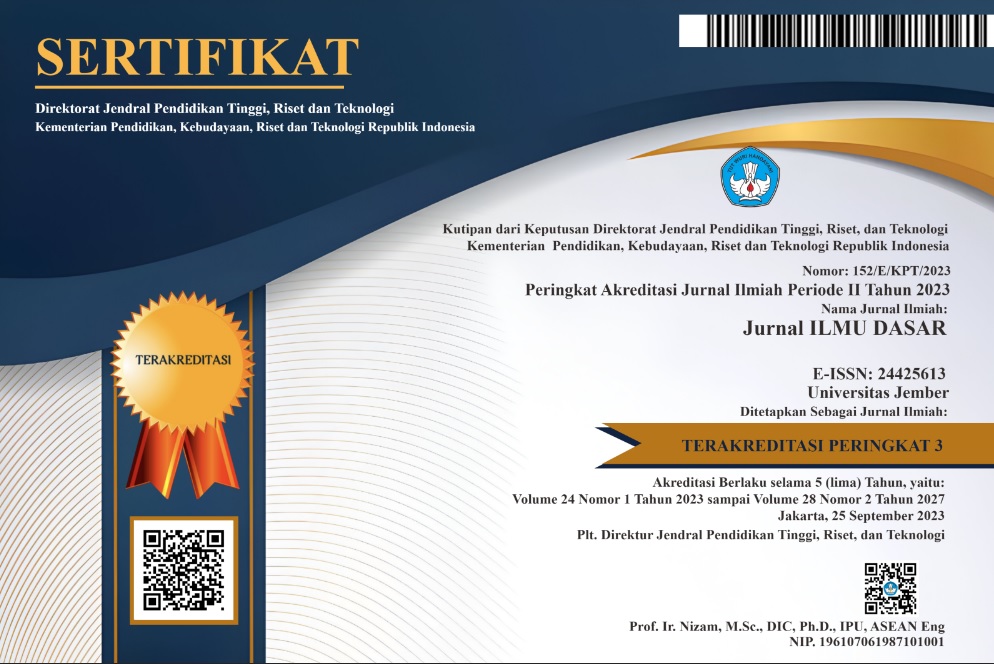Nonpreemptive Goal Programing Method in Optimization Nurse Scheduling by Considering Education Level
DOI:
https://doi.org/10.19184/jid.v22i2.16939Abstract
Nurse scheduling is one of the problems that often arise in hospital management systems. Head of ICU room and nurse to cooperate in making good nurse scheduling for the creation of optimal service. In this paper, we study a hospital nurse schedule design by considering the level of nurse education and the provision of holidays. Nurses with undergraduate education (S1) Nurses become leaders on every shift and are accompanied by nurses with diploma education (D3). The scheduling model in this study using the nonpreemptive goal programming method and LINGO 11.0 software. The preparation of the schedule of nurses assigned to this method can optimize the need for efficient nurses per shift based on education level. The data in the research was obtained by collecting administrative data at Aloei Saboe Gorontalo hospital. The data used are the published schedule by the head of the ICU room. In making a nurse schedule, there are limitations to consider such ashospital regulation. The results of the study obtained an optimal solution in the form of meeting all the desired obstacles. Computational results shows that nurse scheduling using the nonpreemptive goal programming method and LINGO 11.0 software better than the schedule created manually. Every shift is a maximum of one leader with an undergraduate education (S1) background and accompanied by a nurse with a diploma education (D3) background.
Keywords: scheduling, goal programming, nonpreemptive goal programming.
Downloads
References
Azaiez, M. N. and S. S. Al Sharif. 2005. A 0-1 Goal Programming Model for Nurse Scheduling, Computers and Operations Research, 32(3), pp. 491–507.
Beaulieu, H. 2000. A Mathematical Programming Approach for Scheduling Physicians in The Emergency Room, Health Care Management Science, 3(3), pp. 193–200.
Bekkan, C. 2010. Quantitative Methods of Physician Scheduling.
Belien, J., Demeulemeester, E. & Cardeon, B. 2008. A Decision Support System for Cyclic Master Surgery Scheduling with Multiple Objectives, Journal of Scheduling.
Bester, M. J., Nieuwoudt, I. and Van Vuuren, J. H. 2007. Finding Good Nurse Duty Schedules: A Case Study, Journal of Scheduling, 10(6), pp. 387–405.
Brunner, J. O., Bard, J. F. and Kolisch, R. 2009. Flexible shift scheduling of physicians, Health Care Management Science.
Burke, E. K. and Petrovic, S. 2002. Recent Research Directions in Aautomated Timetabling, European Journal of Operational Research, 140(2), pp. 266–280.
Fauziyah. 2016. Penarapan Metode Goal Programming Untuk Mengoptimalkan Beberapa Tujuan Pada Perusahaan Dengan Kendala Jam Kerja, Permintaan Dan Bahan Baku, 02(01), pp. 52–59.
Hammad, Rizani, K. and Agisti, R. 2018. Tingkat Kelelahan Perawat Di Ruang ICU, Jurnal Keperawatan dan Kesehatan, 6(1), pp. 27–33.
Hillier, F. S. and Lieberman, G. J. 2001. Introduction To Operations Research. 7th Ed. New York: Mcgraw-Hill.
Jenal, R. 2011. A Cyclical Nurse Schedule Using Goal Programming, Journal of Mathematical and Fundamental Sciences, 43A(3), pp. 151–164.
Pamungkas, D., Lestari, D. and Sumarno H. M., B. 2016. Model Goal Programming untuk Optimisasi Penjadwalan Perawat di Rumah Sakit Grhasia, Jurnal Matematika - S1, 5(5).
Siregar, P., Gamal, M. D. H. and Saleh, H. 2015. Optimisasi Penjadwalan Perawat Dengan Goal Programming Sebuah Studi Kasus Di Rumah Sakit Umum Padangsidimpuan: 385-398, in, pp. 385–398.
Taha, H. A. 2007. Operations Research An Introduction Eighth Edition. New Jersey: Pearson Education. Inc.








